- Home
- Jane Lebak
Pickup Notes Page 11
Pickup Notes Read online
Page 11
Maybe Harrison had a point: if I ever got married, I should do it at Carnegie Hall.
Speaking of Harrison, with the violin tucked under his chin, he pretended to be alive. He gave our cues. He was on tempo. Though pale, he wasn’t ghostly.
After we finished the movement, we broke while the company president gave a welcome, and diners behaved like a good lunch crowd: eating, conversing, laughing. No one looked in our direction. Perfect. Harrison didn’t topple, so we kept playing.
After Mozart came Beethoven, and following Beethoven were speeches. The banquet manager dismissed us to the prep room.
Harrison handed Shreya his violin and collapsed onto the couch.
I checked him again. Still white-hot.
We dug into our “vendor meals.” The guests dined on whatever costs forty-five dollars a plate; the musicians got hamburgers and fries. Well, half of us. Shreya had a salad. Harrison had nothing.
Sitting with my back to the couch, I said, “You going to try eating?”
He murmured, “This is how I wanted to die, with my bride at my side.”
Josh chuckled.
“There’s nothing wrong with you, Harrison.” An air of menthol ghosted Harrison, the scent of too many cough drops in too short a time. “You want more tea?”
I opened his thermal mug and got a silly smile: chicken broth. He took a little, then flopped on the cushions. I spread my coat over him.
A dutiful quartet always aids its fearless leader: we plundered his meal, Josh nabbing the extra burger, Shreya stealing his salad, and all of us splitting his fries.
“You think we can finish without him?” Shreya said.
I rolled the edges of my hair between my fingertips. “I don’t want to mess with things. It’s only half an hour, so he has to survive just one more piece. We’ll play something we know by heart but most people aren’t familiar with, so they won’t notice any mistakes. You’ll have to give the cues.”
Shreya recoiled. “You think I can?”
I stared at the floor. “You’ve got a better shot than him.”
When the banquet manager fetched us, I dropped a hand on Harrison’s shoulder. “They don’t pay if you die before the gig ends.”
He pushed off the couch, looking miserable and a bit dizzy, so I picked up his violin. He straightened his hair, braced himself, and headed back out.
As we sorted the music, a woman in a business suit approached. “I’m Michelle Emmetts. I had spoken with Harrison Archer.”
He shook her hand, sounding raspy. “Thank you for having us today.”
She said, “You guys are wonderful. Now that the boring part of the lunch is over, we’d really like it if you enlivened things with requests and the fusion mixes.”
Worry stabbed through my heart. But Shreya said, “Absolutely.”
Harrison looked to me. “Can you do the announcing?” He turned back to the executive secretary. “My voice is shot.”
Her brow furrowed. “You sound as if you need to be in bed with some tea.”
“The show must go on!” That smile was undiluted bravado, but she didn’t realize.
A photographer set up in the corner while the banquet manager liberated a microphone. Terrific. I’d forgotten about the Village Voice. They’d capture every instant of our demise.
Harrison was whiter by the second, so I pushed him into his chair. We huddled.
“There’s no way he can do this,” I whispered.
Josh said, “Tell them n-n-no.”
Harrison rubbed his temples. “We are not telling them no. I can do this.”
“You’re going to drop dead,” I hissed.
Shreya said, “No, Joey, I think we can pull it off.” Her brow furrowed. “We’ve practiced the ‘Hotel California’ mix. We’ll lead off with that.” Shreya’s steely eyes gave me a sense she knew what to do, and I tried to focus on her. “I’ll take requests. I can whip stuff off the top of my head and do it solo. We’ve only got to hold out for half an hour. Can you do introductions?”
Nauseated, I nodded. But what else was there? Josh wouldn’t take the mike, and Harrison couldn’t. Nerves or not, I’d have talk.
Shreya gripped my arm. “Even if we fail, we’re going to make a whole lot of noise doing it. They won’t shoot you.” A pause and then, “They might hit you with a slice of seven layer cake.”
I couldn’t even laugh. People were already watching and we hadn’t even begun. My vision sparkled.
Harrison sighed. “I’m sorry.”
I snapped, “Quit being sorry and just sit there before you collapse.”
When he didn’t give me any flack, I felt bad. I also fought the urge to check his pulse. But he had a fever; if he were dead, surely he’d have reached room temperature?
Shreya took the mike, and her posture changed. So did her attitude and the tilt of her head. It hit me in an instant: she’d worked crowds a lot—not just for a late-bride concert. “Now that the talking is over, how about we make Beethoven roll over and give our honoree a lively send-off?” She raised her violin. “Because some places you can retire from, and some places you can’t possibly escape.”
She ripped off the riff to “Hotel California,” then launched into the piece as practiced over the last couple of weeks.
She stood; the rest of us sat. As she moved with the violin, a thing of beauty in both appearance and sound, she transfixed everyone’s attention.
The practice paid off. We moved into the fusion, into the Beethoven, back out into the fused part, and again to Shreya’s solo. She was right: Harrison screwed up a few times, but no one knew those parts, so no one cared. Her cues were awkward, but Josh and I compensated. Meanwhile the photographer canvassed the room to get shots of Shreya, and I struggled not to listen for Harrison’s violin.
She took us through an extra repeat of the theme before calling it quits, then bowed. The guests applauded.
She turned to me, and I tucked my viola against my side to approach the mike.
“Well—” You know how Shreya was totally comfortable doing this? Now they’d get the other extreme. “Since you’ve been listening for an hour, do you know the definition of a string quartet?” No one answered, thank goodness, which would have thrown me off. “One good violinist, one pretty good violinist” (I pointed to Harrison and Shreya in turn), “one failed violinist” (I raised my hand and they chuckled), “and one person who hates violinists” (Josh saluted), “all getting together to talk about how much they loathe composers.” General laughter. My first public viola joke. “Your soloist is Shreya Ramachandran, the pretty-good violinist. If you have a request, let us know, otherwise you’ll be stuck with a bunch of stodgy quartets by dead Europeans.”
I turned to Shreya. “Is the ‘Hotel California’ located on ‘Baker Street’?”
“Why, yes.” She grinned. “I believe it is.”
As I returned to my seat, Josh flashed a thumbs-up. I shuddered because the longest six hours of my life had ended.
Shreya started our somewhat-practiced Baker-Street-Mozart fusion, her violin taking the part of the saxophone solo.
Twenty minutes remaining.
We got a request from the honoree, a dedication to his wife: “Danny’s Song.” Hey, 1971 called and said we could play her theme! It had a violin line, thank heaven, even though it was more fiddly than violinish. Shreya made a few mistakes, but not terrible for setting a bow to strings and letting fly. After a minute, she segued into a movement from Handel’s Water Music we’d played often enough that Josh and I did it from memory (although it took Harrison a few measures to catch on) and every so often she worked the theme back into the piece.
While she soloed, I glanced at the guest of honor, a round-faced man not much older than my father, seated beside a wispy woman in a lacy blouse. He held her hand. You could almost hear the words from Shreya’s violin. So sweet. I wonder if my grandfather felt that way about my grandmother.
Meanwhile Harrison looked like we’d need to
carry him out. His pallor scared me even more than his labored breathing. After a look, Shreya opted against a final request and started the Pachelbel Canon, even though most of the time she claimed she’d prefer to eat fire ants live.
After it finished, I took the mike and thanked everyone. Then I held Harrison’s violin as he struggled to his feet. He shot me a meaningful look, and I whispered, “No CDs. Move it.”
He was alive enough to glare.
In the prep room, he went prone again. Josh said, “I’ll dr-drive you home.”
“Thanks.” Harrison massaged his temples. “I’m nearly dead anyhow.”
He ruined the effect by coughing and then flinching with his hand pressed to his ribs.
A knock came at the door. The guest of honor had approached, and he shocked me because he was only my height. Again I thought of my grandfather.
“I wondered if you had a moment.” The gentleman had a warm smile and clear blue eyes, a softer voice than I’d expected. “Would you happen to have a CD?”
I fished one out of Harrison’s bag along with our business card and a couple of flyers. I didn’t ask for money. “I’m glad you enjoyed the performance.”
He handed me a twenty. “It was a wonderful send-off. Is this enough?”
Shreya dug in her wallet to find a five. I wasn’t sure why she bothered. He seemed young to retire, but maybe these executives went on permanent walkabout once they had a small mountain in the bank.
I smiled. “Well, you’ll have plenty of time to listen to it, relaxing at home.”
His response sounded measured. “My wife and I are looking forward to some time together, yes.” He squeezed my hand. “Thank you.” He went to Shreya and Josh, then Harrison, who hadn’t quite managed to stand, and shook their hands too. “It really was splendid. I’m sorry you had to work while sick,” he said to Harrison. “I know how hard that is.”
The door clicked when he left. Josh handed Harrison his coat, then lifted both Harrison’s violin case and his cello. “Come on, fea-fea-fearless leader. Let’s get you home.”
TEN
The phone rang at eight Wednesday morning. That must mean Harrison was finally feeling better, which also meant it was time to kill him. Poor baby, stir-crazy after canceling his whole week to nestle in bed guzzling NyQuil, but still, he knew I went to bed at three, and this was just too damn early.
That’s when I remembered: Wednesday! The Village Voice would have printed.
And it turned out not to be Harrison anyhow. “Guess what?” sing-songed Josh’s voice.
My heart raced. “You have the paper?”
“Dad left a stack on the k-k-kitchen table.”
Josh’s Dad rocked. “Is it good?”
“I haven’t checked. You want me to rrr-read it to you?”
I curled under the covers. “Yeah, go ahead.”
Eyes closed, I listened to Josh describe two pictures, one of us arranged on Harrison’s couch and another of Shreya performing at the retirement party.
“Mmm.” I shifted the phone to get more comfortable. “Don’t stop.”
About three paragraphs into the story, my mouth tingled and I couldn’t focus. Not because I was falling asleep, but because the more awake I got, the more I realized what I was hearing. They said we’d share an article with three groups, yet instead the Boroughs String Quartet was hogging several dozen column-inches all to ourselves in New York’s largest entertainment weekly.
This wasn’t just a mention in a wedding write-up. This was us, larger-than-life. Heck, after hearing it, I wished I could hire this group.
We were, they claimed, “evangelizing chamber music” by “rendering it accessible.” We’d shattered the public perception of classical as something for sherry-sipping septuagenarians who wouldn’t recognize Darth Vader.
Josh burst out laughing, and I exclaimed, “What? What?”
“Guess what?” he said. “I’m mysterious.”
“Get out!”
“Dead serious. Cellist J-j-j-j-joshua G-g-g-g—shit.” He’d never gotten out his whole name in one shot. “...me.... is a mysterious man who maintains a silent presence in the background.”
“Deep,” I said.
“Very.”
He kept reading, and the occasional stutter gave me time to linger. Call waiting beeped, and I ignored it to keep hearing him tell me about ourselves.
When he ended, I said, “How does it feel to be mysterious?”
“If I told you, I wouldn’t be mysterious anymore.”
“Touché.” I chuckled. “I guess a sharp reporter notices when someone doesn’t utter a single word during an hour-long interview.”
“Can’t fool the prrr-ress.” Josh prolonged the word so he purred it.
“Lucky,” I said. “Women throw themselves at the strong silent type.”
Josh laughed. “As if. They always go for our ‘good-looking, enthusiastic f-f-f-first violinist.’”
The article barely mentioned me, par for the course, although it mentioned the viola jokes.
“I keep getting call-waiting.” I rolled over in bed. “Twice in three minutes. Harrison?”
“Bet on it. He beeped mmm-me too.”
“Let him sit. Actually, let him phone Shreya.” I stretched, arching my back. “We ought to celebrate.”
“Come over,” said Josh. “I’ll make breakfast.”
It took thirty minutes to shower, dress, and get to the place he shared with his dad. Josh met me on the front stoop, then unburdened me of a bag of donuts and handed me a copy of the Village Voice before I even got into their apartment.
I re-read it standing over his kitchen table. We were right there in front of us: the mysterious cellist, the invisible violist, and the two sassy spotlight-hugging violinists. The struggle to survive as a musician, the magic of pulling “Hotel California” out of a hat, the birth of a new repertoire, and our determination to carry on despite losing our keystone song.
“This is—” I turned to Josh to find his eyes bright. I didn’t know what to say. “It looks real.”
He knew what I meant.
While I unzipped my jacket, I noticed a small animal nosing around the baseboards. “Oh! I finally get to meet them!” I crouched, holding out my hand, but it ignored me. Josh always had a pet. When the last hamster had died in January, he’d picked up a pair of hedgehogs.
I hunted for a place to pet the thing where it wouldn’t stick me. “What did you name them?”
He paused. “They won’t c-come when you c-c-call.”
I said, “And—?”
He went to the table and typed into his laptop: “Stradivarius” and “Shostakovich.”
I winked. “The match for Stradivarius ought to be Guarneri.”
He grinned. “I n-n-need the verrr-bal exercise.”
I tried to touch it again, but it waddled away. “What do they eat?”
“Insects. Mealworms.”
“Bow mites?”
Josh shuddered. I laughed.
Beside the laptop he had the conductor’s score for Beethoven’s Fifth Symphony; on the screen was Sibelius, our music notation software. Oh, yeah, that stupid bride wanted it done as a quartet.
While he tended to breakfast, I checked it over: he’d dismantled the symphony into the motive (Da-da-da-DUMM…) and barely anything else. Think of what you’d find on a crank-driven music box that said “Beethoven’s Fifth.” Josh was enough of an arranging genius to generate four lines and three minutes of this, and as Harrison said, the bride wouldn’t care. If she wanted something this ridiculous, she wouldn’t know why it was ridiculous when we played it, even if Beethoven’s ghost broke a viola over my head. But if Harrison wanted to play this ever again, I’d feed him his rosin cake.
The coffee maker beeped. Josh took a bowl of beaten eggs from the fridge, plus butter and mushrooms. I set the English muffins in the toaster while he cooked omelets and fried bacon. I put away his laptop but kept the newspaper out, and while we ate, we l
ooked it over again.
I frowned. “I’m not happy about them saying we don’t have the rights to ‘Hotel California.’ People might think it’s bait-and-switch.”
Josh shrugged.
“We should write the reporter a thank-you note.” I looked up. “That’s what you do, right?”
“Yeah, because I majored in pub-publicity.”
Josh’s father Ed emerged from his bedroom, asking about all the fuss, then roaring with laughter and clapping him on the shoulder. “You guys did terrific. I’ve got to read it!”
That wasn’t like him. “I thought you brought it in?”
“I wanted you guys to have the honor of reading it first.” He beamed. “But I could barely sleep. I wanted to wake Josh up!”
Josh watched him read, grinning the whole time. “You, mysterious?” Ed exclaimed. “I’ve seen more mysterious things in the back of the fridge!” When I giggled, Ed sighed. “I’m real proud of you.” He turned to me. “I’m proud of you too. You guys worked real hard for this.”
“It’s not the Nobel prize in music.” My ears burned. “It’s good, though. We might pick up more clients.”
“I’ll bet you get a million!” He slapped Josh’s back. “I’m getting ten more copies and sending them to your grandmother, Aunt Connie and Uncle Jake, Aunt Donna, Andrew, and some to save.” He took another look at his son’s picture in the paper. “Say, did you guys leave any breakfast for an old man who only plays the radio?”
By eleven o’clock we’d arrived at Harrison’s. I had seven missed calls, three resulting in voice mail requests for more information. Josh took care of my jacket and viola while I transcribed names and numbers and mentally blocked Harrison’s nonstop commentary. If our headline had bumped shoulders with a Mars landing, world peace, and the discovery of an infinitely renewable natural resource whose only byproduct was champagne, he wouldn’t have noticed.
Shreya had a brilliant idea: “Perhaps we could practice?”

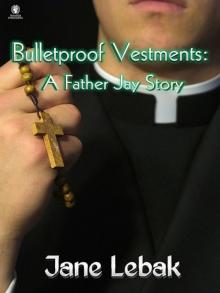 Bulletproof Vestments
Bulletproof Vestments The Wrong Enemy
The Wrong Enemy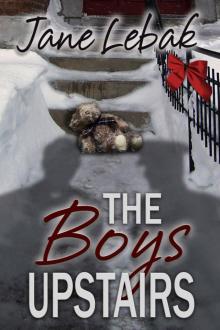 The Boys Upstairs (Father Jay Book 2)
The Boys Upstairs (Father Jay Book 2)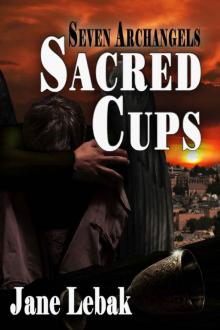 Sacred Cups (Seven Archangels Book 2)
Sacred Cups (Seven Archangels Book 2)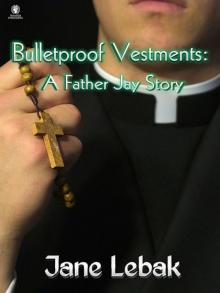 Bulletproof Vestments: A Father Jay Story
Bulletproof Vestments: A Father Jay Story An Arrow In Flight (Seven Archangels Book 1)
An Arrow In Flight (Seven Archangels Book 1)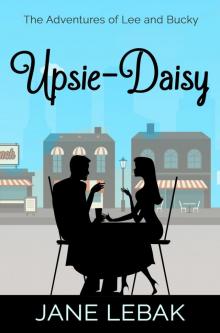 Upsie-Daisy
Upsie-Daisy Shattered Walls (Seven Archangels Book 3)
Shattered Walls (Seven Archangels Book 3)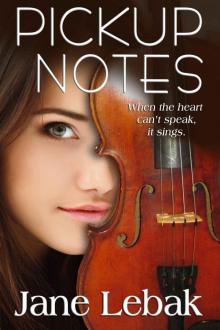 Pickup Notes
Pickup Notes